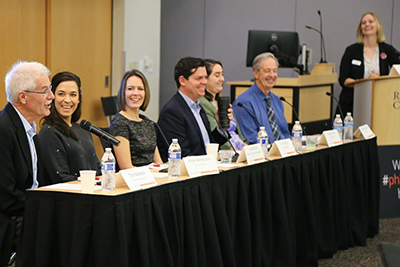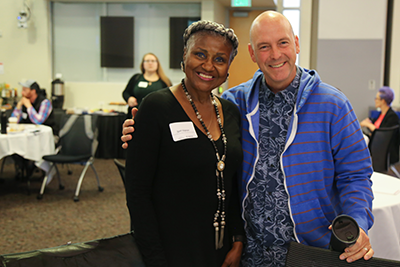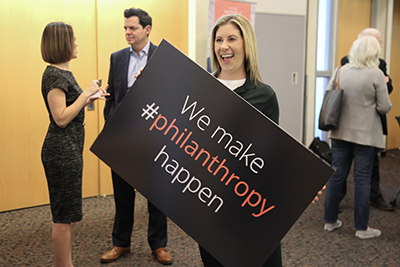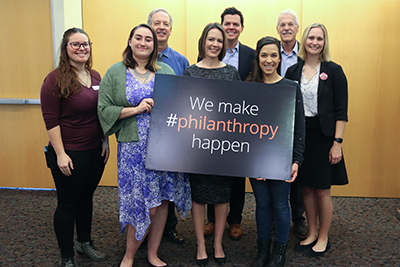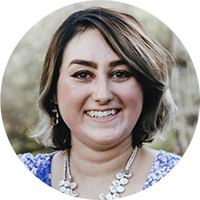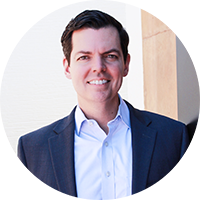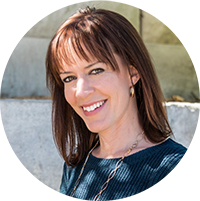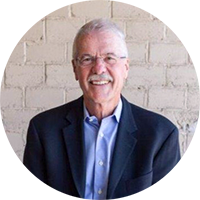Panel Review: Fundraising for the Rest of Us
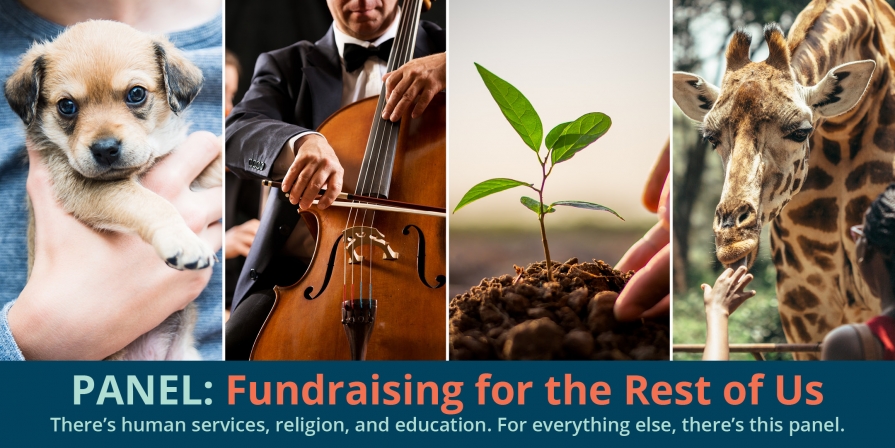
According to the latest Giving USA report, Americans gave $427.71 billion to charity in 2018, with organizations focused on religion, education, and human services receiving the largest piece of the philanthropic pie, so to speak. This trend, however, raises a particular question for other organizations: how do nonprofits outside of these three subsectors leverage their own fundraising strategies to increase their piece of the pie? To help nonprofit professionals answer this question (and so many more), we hosted our Fundraising for the Rest of Us panel event and welcomed six incredible speakers to discuss fundraising strategies, important trends, and more.
Our Favorite Takeaways
Takeaway #1: Focus on experiential engagement.
One challenge these six organizations face is the fact that it’s difficult for potential donors to see the “human” side of causes like environmental conservation, animal welfare, arts and culture, etc. So how do we combat this? Through experiential engagement! Donor engagement is incredibly important in attracting and maintaining your donors but can be difficult when the cause focuses on music or climate change. One tip our panelists recommend is focusing on donor engagement through meaningful experiences, which is likely to keep your donors coming back for more.
Amanda Frein, for instance, notes that while the Zoo has always been a family-friendly organization tailored to children, they wanted to create experiences that would attract adult donors as well. This led to the inception of the Zoo’s Roars and Pours event, an after-hours, 21-and-over experience designed to provide a night out for adults that allows them to enjoy the Phoenix Zoo in a new and unique way while partaking in craft beers and other refreshments. Frein notes that this is a prime example of how the Zoo focuses on getting to know their donors and using this knowledge to create meaningful experiences that inspire people to give.
Bob Bondlow also says that experiences are key for shaping the engagement levels of potential donors. The Phoenix Symphony, for instance, offers an educational program called “Mind Over Music,” which is designed to bring music and STEM concepts together in a meaningful way for students. Bondlow explains that students in this program can better understand fractions, for example, through counting measures and writing their own bar of music. The best part? A Symphony musician will actually play the measure of music that the students write, thereby creating an unforgettable experience for students and teachers alike.
If you’re not sure how to start creating these meaningful experiences, get with your team and identify what sets your organization apart from others. Chances are that you already have a unique or interesting story that can lead to your next great idea for experiential engagement.
Takeaway #2: Don’t forget about the education piece.
Educate, educate, educate! Education is a critical component to attracting donors, especially those that do not currently support your cause.
Many donors do not necessarily understand or see the inherent value of your organization, so don’t be afraid to share this information with them.
Liza Noland, for instance, mentioned that with Local First, it can be difficult helping consumers understand not only how to buy locally but why buying locally is important. She says that educating donors on the significance of your cause and the impact of your mission can do a lot for attracting donors that may have once felt out of reach. So don’t be afraid to share this information with your community! Trust that your organization is doing important work, and remember that sharing your impact is a key component to attracting donors.
Takeaway #3: Invest in an effective marketing strategy.
Marketing is a hot topic in today’s world, especially with the ever-rising engagement on social media. But marketing is so much more than simply sharing an article on LinkedIn or posting a photo on Instagram, and there are many skills that are crucial for effective marketing. Many tend to think that marketing is a “nice to have” tool, but in reality, it is critical for boosting donor engagement and reaching new markets.
Annie Verderame, in particular, praises the value of an effective marketing strategy and encourages organizations to invest in a dedicated marketing expert. Storytelling, she noted, is a major component to a strong marketing strategy and is a great way to generate content on social media. In fact, Annie shared a compelling story about a sweet mama pup that had been searching for her “fur-ever” home for nearly six months before finally being adopted, thanks to the dog’s presence on Instagram. Analytics are also extremely important for a successful marketing campaign, so make sure you’re asking for data points the next time your organization is looking to hire a marketing expert.
Dan Hagerty, too, agrees that marketing is key, but he also urges organizations to promote collaboration internally, especially between marketing and development, to make the most of your marketing strategy. Marketing and development don’t see as much success when they operate independently, and Dan notes that it’s important for development teams to convey unique stories to marketing and for marketing teams to report analytics back to development. This collaboration can help close communication gaps in your organization and ensure that both teams are operating effectively and keeping up with the latest trends.
Takeaway #4: Cultivate those long-term partnerships.
In the nonprofit world, we put a lot of emphasis on individual donors. This comes as no surprise, given that the 2018 Giving USA report noted
that individual donations accounted for more than 68% of the total charitable giving that year. However, while it is critical to maintain your individual donors, it is just as important to cultivate effective community partnerships through corporate donors, philanthropy groups, educational institutions, and more.
As a living testament to the success of long-term partnerships, Tom Waldeck shared insights on an important relationship with one of his most engaged corporate donors. The relationship with this donor has seen seven or eight years of successful stewardship, and because of this, Keep Phoenix Beautiful has received several in-kind donations over the years, ranging from equipment to volunteer hours to the latest gift: a marketing video that cost $100,000 to produce. Waldeck says that this is a prime example of how partnerships can make all the difference in your organization. Cultivating several strong relationships like these is a great way to garner support from the community, as well as receive gifts and donations to help further your mission.
Meet the Experts
Bob Bondlow, Major Gifts Officer
Phoenix Symphony
Bob is the Major Gifts Officer for The Phoenix Symphony, where he cultivates a portfolio of more than one hundred individual and corporate donors annually. Prior to joining the Phoenix Symphony, he served as the Major Gifts Officer for Ballet Arizona, raising contributions from corporate, foundation, and government funders. He has served as a panelist reviewing grant proposals for the Illinois Arts Council, the Chicago Department of Cultural Affairs, and the Michigan Council for Arts and Cultural Affairs.
Amanda Frein, Development Specialist
Phoenix Zoo/Arizona Center for Nature Conservation
Amanda Frein has been with the Phoenix Zoo for three years and has served in many roles, including volunteer and Development Specialist. Over the last 10 years, she has spent her time working at local animal shelters and is passionate about global wildlife conservation. She believes sustainability, education, and environmental conservation all play key roles in the preservation of species.
Dan Hagerty, Director of Strategic Development & Programming
Heard Museum
Dan is the Director of Strategic Development and Programming for the Heard Museum and manages the museum's education, outreach, public programming, and development teams. Prior to joining the Heard, Dan served as the Executive Director of Miami City Ballet, Senior Consultant for the DeVos Institute of Arts Management, and producer and fundraiser for PBS and NPR.
Liza Noland, Director of Rural Programs
Local First Arizona
Liza serves as the Director of Rural Programs for Local First Arizona and is known for innovative digital advertising initiatives and brand identity development for nonprofit organizations, municipalities, and small businesses throughout Arizona. She has received national recognition for a Boys & Girls Club Resource Development campaign and is a two-time Arizona Association for Economic Development Golden Prospector Award winner.
Annie Verderame, Social Media Guru
Almost There Rescue
Annie Verderame serves as the Social Media Guru for Almost There Rescue, where she showcases adoptable pups each and every day. She is tireless when it comes to writing fun bios and captions that grab viewers’ hearts. Annie has two adorable rescues of her own (one of which she adopted from ATR) and is passionate about dogs in need. She has volunteered at Maricopa County Animal Care and Control with Community Canine Project and has even dedicated her time to Arizona Small Dog Rescue.
Tom Waldeck, President & CEO
Keep Phoenix Beautiful
Tom Waldeck, President & CEO of Keep Phoenix Beautiful, is a member of the Board of Directors of Keep America Beautiful, where he serves as Treasurer on the Executive Committee, Arizona Community Trees Council, and TigerMountain Foundation. Keep Phoenix Beautiful manages over 5,000 volunteers a year, teaches 12,500 children annually about recycling, runs a robust Special Event Recycling Program, and operates two community gardens here in Phoenix.
Register today for our next panel, Making the Most of Your Digital Fundraising Strategy, to gain even more insights on how to boost your fundraising efforts!

